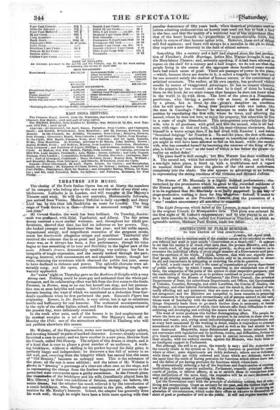Something like a century and a half had elapsed since
the last produc- tion of Fletcher's Double Marriage, before Mrs. Warner brought it out at the Marylebone Theatre; and, seriously speaking, if it had been allowed to repose on the shelf for a century and a half longer, we do not see that the people living in the course of the aggregate three hundred years would have had much cause of grief: There are passages of power in the piecei —which, because there are deaths in it, is called a tragedy; but it does not. for one moment satisfy the student of human nature, or the connoisseur Of artistical structure. -The author, at his own caprice, has produced violent' results by means or -exaggerated _personages: lie. has no respect whatever,. for the puppets 'he has created; and when he is tired of them he knocks- them on the head, for no oilier reason than because lie does not know what - in the world to do with them. . The hero of the piece is a Neapolitan gentle-min, who, 'having a pattern wife at Lome, is taken prisoner by a pirate, but is freeds-hr -,the ..pirate's daughter on condition that he will marry her. Being 'thug perplexed with two ladies, like the man in Canning's Roverr:he attempts to make the best of his position by repudiating the first -Wife, whom he loves, and allOwirig the second, whom he does not love,'to enjoy his property, bet otherwise to live in a state of single blessednesa. This arrangement overwhelms the first wife, who is all goodness, with grief, and fills the second, who is all bad- ness, with rage; so that our hero, with his semi-virtuous cleverness, finds himself in a worse scrape than if he had lived with Number I and taken "furnished lodgings" for Number 2. To end the piece, the first wife stabs the unhappy man by aceident, in a manner s inartificial that a chimney- pet might as well have been allowed to fall on his head; while the second wife, who has consoled herself by becoming the mistress of the King of Na- ples, is killed in a " row," at the head of which is her father the pirate—in reality an exiled duke! -The piece itself is dull enough; but Mrs. Warner has done wonders for it. The second act, -which lies entirely in the pirate's ship, and in which a sea-fight takes place, is fitted up with a truthfulness and a regard to nautical detail that throw the glories of the old naval melodrama completely into the shade. She also appears to advantage as en,itottress, in representing the strong emotions of the virtuous and devoted firierrilit.


























 Previous page
Previous page